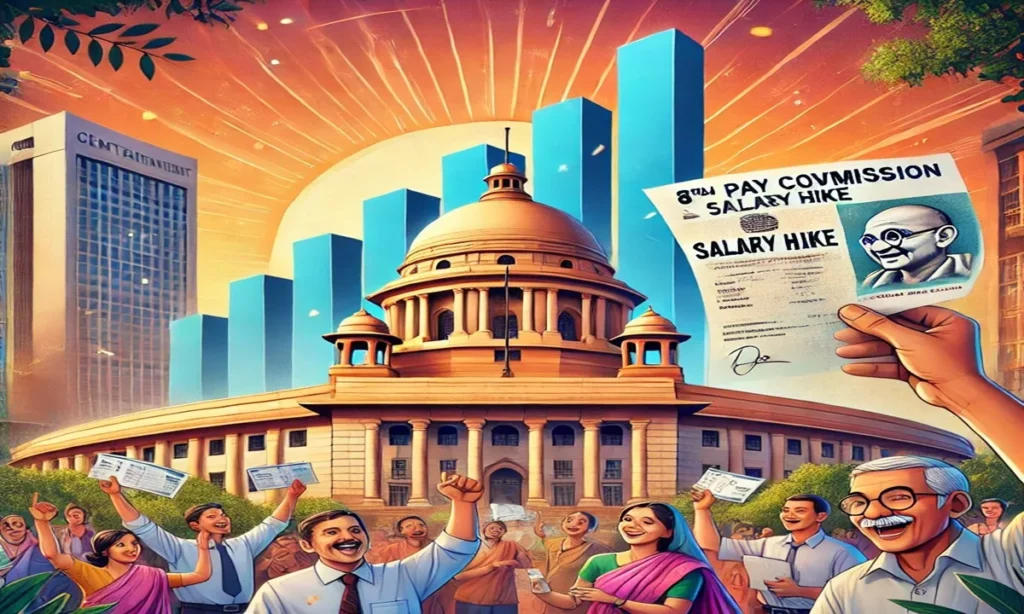
Contents
8th Pay Commission Salary Hike: Pay Structures and Economic Outlook
The 8th Pay Commission salary hike promises a significant changes of central government employees pay structure, with substantial increases in both basic salaries and pensions.
On January 16, 2025, the Union Cabinet, led by Prime Minister Narendra Modi, approved the 8th Pay Commission, signaling a major shift in the salary and pension framework for central government employees. With over 50 lakh employees and 65 lakh pensioners set to benefit from the revised pay scales, the hike could be one of the most significant adjustments in India’s public sector salary structure in recent history.
8th Pay Commission Salary Hike Means
Reports suggest that the fitment factor, which determines the salary revision, may range between 1.92 to 2.86. This change is expected to push the minimum basic salary for government employees from Rs 18,000 per month to Rs 51,480, while the minimum pension could rise from Rs 9,000 to Rs 25,740 per month. These changes will provide a considerable boost to the purchasing power of central government workers and retirees.
Historical of Pay Commissions in India
The 8th Pay Commission follows a long line of pay commissions that have been instrumental in reshaping the compensation structure for government employees in India. Each pay commission was designed to meet the evolving needs of the workforce and address the changing economic landscape. Here’s a brief look at the earlier pay commissions:
- 7th Pay Commission (2014-2016): Introduced a pay matrix, simplifying the earlier grade pay structure. The minimum pay was set at Rs 18,000.
- 6th Pay Commission (2006-2008): Established Pay Bands and Grade Pay and focused on performance-linked incentives.
- 5th Pay Commission (1994-1997): Aimed at modernizing government offices and reducing the number of pay scales.
- 4th Pay Commission (1983-1986): Worked on reducing disparities between different ranks and introduced performance-linked pay.
- 3rd Pay Commission (1970-1973):
- Minimum Pay: Rs 185; Maximum Pay: Rs 3,500.
- This commission stressed the need for salary parity between the public and private sectors, aiming to make government service more attractive and competitive.
- 2nd Pay Commission (1957-1959):
- Minimum Pay: Rs 80; Maximum Pay: Rs 3,000.
- It addressed economic balance and living costs, with a strong emphasis on creating a “socialistic pattern of society.”
- Beneficiaries: Approximately 25 lakh employees.
- 1st Pay Commission (1946-1947):
- Minimum Pay: Rs 55; Maximum Pay: Rs 2,000.
- This commission introduced the principle of a “living wage” to ensure fair compensation for government employees, benefiting about 15 lakh employees.
The Economic Impact of the 8th Pay Commission Salary Hike
8th Pay Commission salary hike is expected to have wide-reaching effects on India’s economy.
- Increased Consumer Spending: With higher salaries, government employees will have more disposable income, leading to increased consumer demand in sectors such as real estate, automotive, and consumer goods.
- Boost to Pensioners: Retirees will benefit from a substantial increase in their pensions, improving their financial security and quality of life.
- Inflation Concerns: Some economists are wary of inflationary pressures as a result of the salary hike. Increased purchasing power could drive demand, pushing prices up in various sectors.
- Improved Standard of Living: Labour and employment specialists argue that the hike will improve the standard of living for government employees, helping them keep pace with rising living costs.
Conclusion
The 8th Pay Commission salary increase is set to play a crucial role in enhancing the financial well-being of millions of government employees and pensioners. While the immediate economic benefits, such as increased consumer spending, are expected to stimulate certain sectors, there are valid concerns regarding inflation. Policymakers and financial analysts will closely monitor the implementation of these changes, ensuring that the economic impacts are balanced.
Also read this
8th Pay Commission Fitment Factor: 2.57 or Higher ?
DOP Employee Portal: Direct Link- Salary slip | Apply Leave | Service Book
8th Pay Commission News and overview

